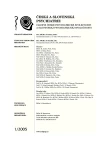-
Medical journals
- Career
The Adverse Events of Lithium Treatment, their Mechanisms and Management
Authors: Ľ. Virčík; E. Rusínová
Authors‘ workplace: Psychiatrická nemocnica, Michalovce
Published in: Čes. a slov. Psychiat., 101, 2005, No. 1, pp. 36-39.
Category: Comprehensive Reports
Overview
Lithium has been standard drug therapy for bipolar disorder over the last 25 years. It is an alkali methal that shares many properties with sodium and potassium. Adverse effects involving multiple organ systems are common and require careful patient monitoring throughout treatment. Mild gastrointestinal upset, fine hand tremor, and muscle weakness may occur transiently during initial therapy, but they usually subside and are generally tolerated. Cognitive dulling and weight gain may be more problematic. Other adverse events associated with chronic lithium treatment (e.g., thyroid and renal dysfunction, toxic serum levels) can be serious but are usually prevented by vigilant monitoring and appropriate intervention.
Key words:
lithium, bipolar disorder, alkali metal, cognitive dulling, weight gain.
Labels
Addictology Paediatric psychiatry Psychiatry
Article was published inCzech and Slovak Psychiatry

2005 Issue 1-
All articles in this issue
- Influence of Partner Relationships on the Course of Psychotic Disease
- The Adverse Events of Lithium Treatment, their Mechanisms and Management
- Current Opinions on Alcohol Abuse and Dependence in the Elderly
- University Graduated Clients Treated in Ward for Treatment of Addictive Disorders in Psychiatric Hospital in Brno-Černovice
- Psychosocial Stressors in Young Families from Brno and Znojmo Part I
- Evaluation of Psychopathology in Patients Suffering from Paroxysmal Supraventricular Tachycardia One Year after Radiofrequency Catheterization Ablation
- EEG Alterations during Clozapine Therapy
- NDRI Concept in the Treatment of Depression
- Czech and Slovak Psychiatry
- Journal archive
- Current issue
- Online only
- About the journal
Most read in this issue- NDRI Concept in the Treatment of Depression
- The Adverse Events of Lithium Treatment, their Mechanisms and Management
- EEG Alterations during Clozapine Therapy
- Influence of Partner Relationships on the Course of Psychotic Disease
Login#ADS_BOTTOM_SCRIPTS#Forgotten passwordEnter the email address that you registered with. We will send you instructions on how to set a new password.
- Career

